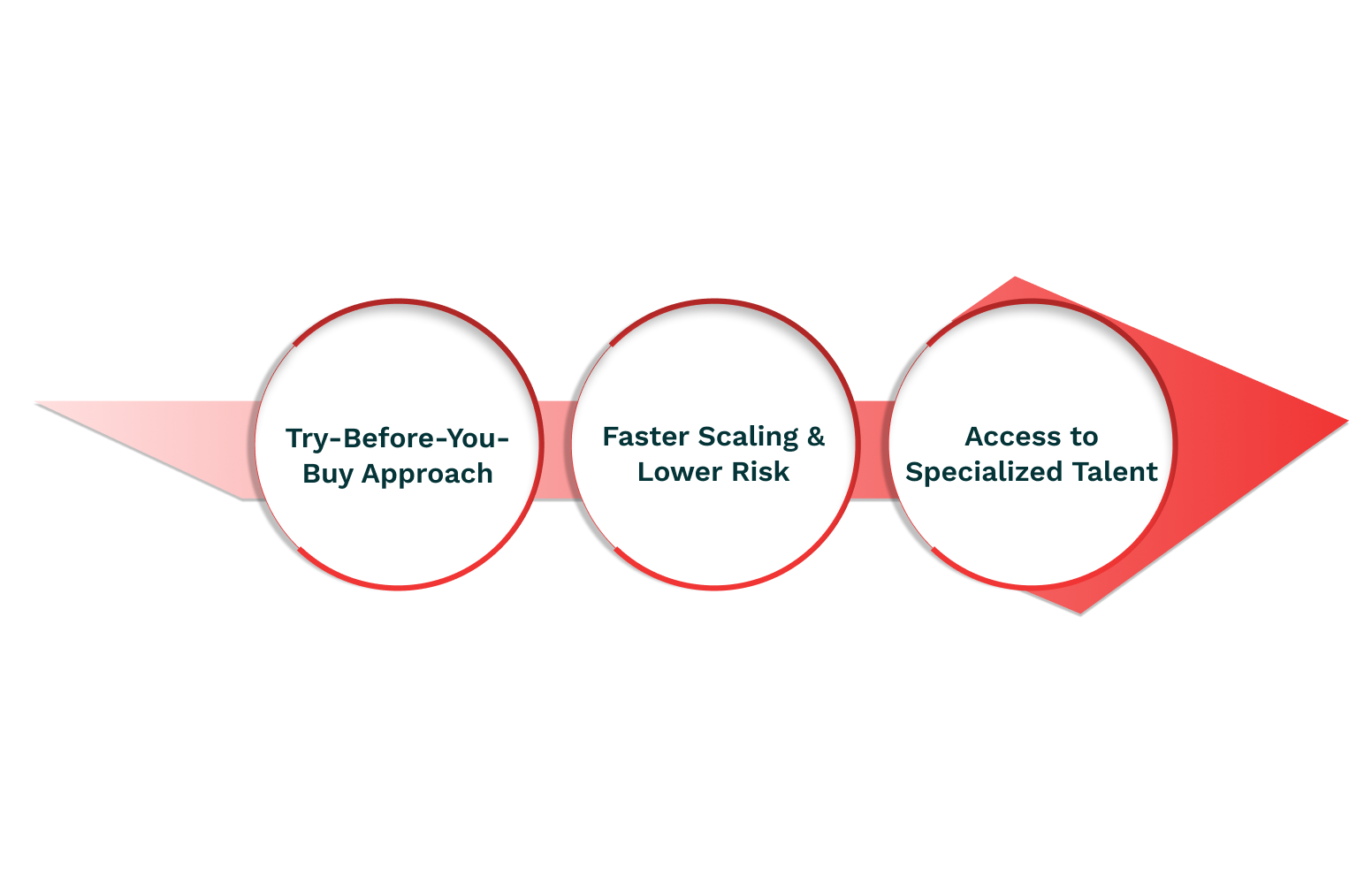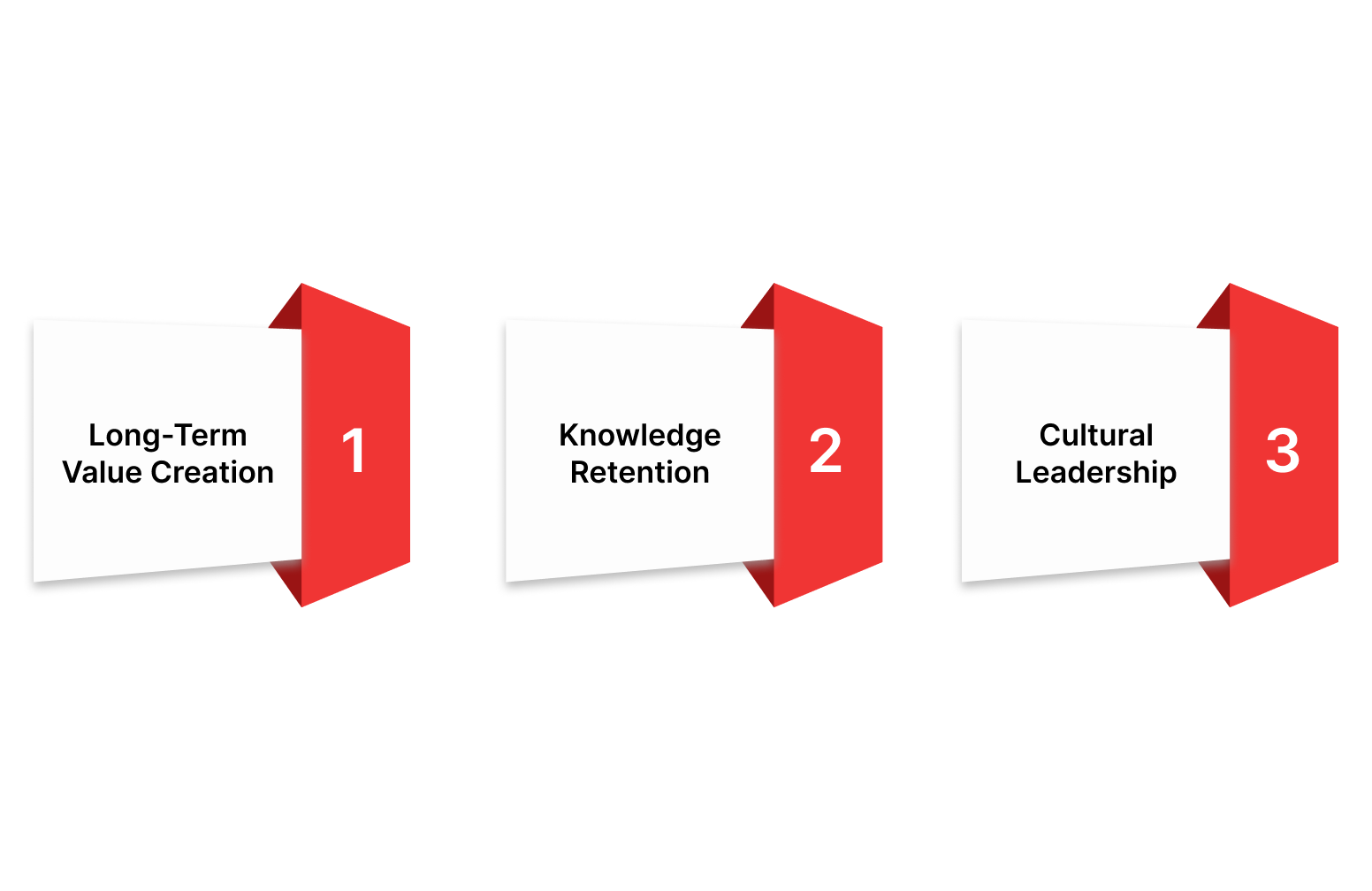TL;DR
- Flexibility vs. Stability: Contract-to-hire arrangements offer short-term flexibility and reduced risk, making them ideal for project-based or uncertain roles. Full-time hiring provides long-term stability and deeper organizational engagement.
- Cost and Commitment: Contract-to-hire engineers typically have higher hourly rates with fewer benefits, making them suitable for short-term or budget-conscious hiring. Full-time hires come with more benefits and long-term commitments.
- Use Cases Differ: Contract-to-hire works well for startups, specialized tasks (like cloud or AI projects), and short-term scaling. Full-time is better for core product roles, leadership, and long-term growth.
- Onboarding Focus: Contract-to-hire emphasizes quick integration and deliverables; full-time onboarding includes cultural alignment and long-term development.
- Strategic Fit Matters: The best model depends on your company's stage, project scope, and need for either specialized expertise or institutional knowledge retention. Many businesses find a hybrid approach most effective.
The software industry faces an unprecedented hiring challenge. Traditional recruitment methods struggle to keep pace with rapid technological changes and evolving project demands. We understand how frustrating it can be for staffing agencies and recruiters to navigate these fast-moving demands while trying to secure reliable tech talent quickly and efficiently.
Finding skilled talent quickly without long-term risk is critical for hiring managers, tech recruiters, and staffing agencies. Flexible hiring models like contract-to-hire software engineers have emerged to address these shortages while keeping projects on track.
As remote work and project-based development reshape how tech teams form, businesses now balance immediate needs with long-term strategy. This shift creates fresh opportunities for companies and developers alike.
This blog discusses how contract-to-hire software engineers and full-time hires compare, helping you make smarter hiring choices for your next tech project.
What is a Contract-to-Hire Model?
A contract-to-hire model begins with a temporary contract (typically 3–6 months) where you evaluate an engineer's technical skills, problem-solving ability, and team fit in real time. If both sides are satisfied, the engineer transitions to a full-time role.
For hiring managers and tech recruiters managing fast-changing projects, the contract-to-hire software engineers model offers a smart middle ground between contract gigs and full-time employment.
When It Works:
This hiring model benefits companies when:
- Managing project-based work with shifting deadlines
- Startups need talent without heavy overhead
- Screening senior software engineers for future leadership roles
- Handling specialized work like cloud migration, AI, or DevOps projects
Why It Matters:
It reduces hiring risk while offering flexibility, letting you see how candidates perform in live projects before committing long-term.
What is a Full-Time Hiring Model?
Full-time employment establishes a permanent relationship featuring fixed salaries, benefits, and career growth opportunities, ideal for roles requiring ongoing contribution. A full-time hiring model remains essential for staffing agencies and hiring managers to build stable, long-term tech teams.
When It Works:
Choose this model for:
- Core product development roles
- Technical leadership positions
- Projects demanding long-term system knowledge
- Companies focused on building team culture and knowledge retention
Why It Matters:
Full-time software engineers invest in your company's success, carry institutional knowledge, and drive process improvement, providing lasting value.
Key Differences Between Contract-to-Hire and Full-Time Roles
Understanding the differences between contract-to-hire software engineers and full-time hires helps you choose the right model for each role. This quick comparison highlights how these two hiring models differ in structure, commitment, and risk.
Let's take a closer look at these differences.
Employment Duration Impact
Contract-to-hire offers evaluation periods that benefit both parties. You reduce hiring mistakes while engineers assess company fit before committing to the long term.
Full-time positions offer immediate stability, but they require confidence in your hiring decision. Termination costs and replacement efforts increase with permanent hires.
Benefits and Compensation Differences
Contract-to-hire software engineers often receive higher hourly rates but limited benefits. They typically handle their own insurance, retirement planning, and professional development.
Full-time employees accept lower base compensation in exchange for comprehensive benefits, job security, and career advancement opportunities.
Onboarding and Integration Approaches
Contract-to-hire onboarding focuses on quickly integrating engineers to meet immediate project goals by emphasizing technical requirements and clear deliverable expectations.
Full-time onboarding includes cultural fit, long-term goal setting, and comprehensive training programs that extend beyond immediate project needs.
These structural differences influence how each model serves your business objectives and team dynamics.
Benefits of Hiring Contract-to-Hire Software Engineers

Contract-to-hire arrangements provide strategic advantages for companies seeking flexibility and reduced hiring risks.
Here are a few benefits of onboarding contract-to-hire software engineers:
Try-Before-You-Buy Approach
Observe real work performance rather than relying solely on interviews. Extended evaluation reveals problem-solving skills, communication style, and team fit through actual project work.
Faster Scaling and Lower Risk
- Minimal onboarding for immediate productivity
- Scale teams up or down based on project phases
- Avoid expensive hiring mistakes (150-200% of annual salary)
- Natural contract endings without termination complexities
Access to Specialized Talent
Many experienced software engineers prefer contract work due to its variety and higher rates, which allow access to consultants and specialists, including remote professionals, not typically found in traditional roles, thereby broadening their talent pool.
Need to scale your team quickly with top-tier talent? Tap into Consultadd's network of 800+ verified Full‑Stack, Cloud, and DevOps specialists. With 5,000+ placements and 13 years in the business, hiring managers can onboard proven contract-to-hire software engineers in record time, without long-term risk. Talk to our experts →
Benefits of Hiring Full-Time Software Engineers

The benefits include:
Long-Term Value Creation
Full-time engineers invest in company success, as their career growth depends on the organization's performance. They develop a comprehensive business understanding that guides strategic technical decisions.
Stability and Knowledge Retention
- Lower turnover reduces recruitment costs
- Accumulated institutional knowledge prevents repeated mistakes
- Experienced members mentor new hires and maintain standards
- Deep system understanding accelerates complex problem-solving
Cultural Engagement and Leadership
Full participation in company culture leads to higher-quality work and stronger collaboration. Engineers contribute to process improvement and drive innovation initiatives that shape the organizational future.
Despite the apparent differences in the two hiring models, the question is:
Which Model is Right for Your Company?
Your optimal hiring approach depends on multiple factors, including project scope, company stage, and strategic objectives. Here's how to make the best decision:
Decision Framework
Consider these factors when choosing:
- Consider your project timeline and complexity when evaluating hiring models. Short-term projects under six months often suit contract-to-hire arrangements better than full-time commitments.
- Budget constraints and cash flow patterns influence your choice. Contract-to-hire provides predictable costs without long-term benefit obligations.
- Skill requirements matter significantly. Specialized expertise for specific projects works well with contract arrangements, while core competencies benefit from full-time development.
Company Growth Stage Considerations
- Early-stage startups benefit from contract-to-hire flexibility as product requirements and team needs remain uncertain. You can adjust quickly without significant restructuring costs.
- Growth-Stage Companies might blend both models, using contract-to-hire for scaling while maintaining full-time core teams for stability and culture building.
- Established Enterprises typically prefer full-time engineers for strategic roles while using contract-to-hire for specialized projects or temporary capacity increases.
Team Structure and Scalability Needs
- Small teams require versatile engineers who can handle multiple roles. Full-time hires often provide better value for these generalist positions.
- Large development teams can accommodate specialized contract engineers alongside full-time core members. This hybrid approach strikes a balance between flexibility and stability.
- Remote-first companies find contract-to-hire arrangements easier to manage since location independence reduces onboarding complexity.
Use Case Examples
- MVP Development: Startups use contract-to-hire for minimum viable products without long-term commitments
- Cloud Migration: Companies hire contract specialists for 6-12 month projects, then evaluate for permanent roles
- Team Scaling: Growing firms rapidly expand capacity during funding rounds, converting successful contractors
- Specialized Features: AI or blockchain development often starts with contract specialists before building internal expertise.
Conclusion
Contract-to-hire and full-time models each serve distinct business needs. Contract-to-hire provides flexibility and reduced risk for specialized projects or uncertain conditions. Full-time employment creates stability and builds institutional knowledge for core development needs.
Consultadd acts as your behind-the-scenes tech talent partner, helping staffing agencies access pre-vetted software engineers for both contract-to-hire positions. With over 13 years of experience and 5,000+ successful placements, we streamline your hiring process while reducing risks and administrative burden.
Our Services Include:
- Access to 800+ verified Full-Stack, Cloud, and DevOps professionals
- Comprehensive candidate screening and background verification
- Interview coordination and visa compliance management
- Dedicated account management for personalized hiring strategies
- Complete administrative support, including payroll, benefits, and compliance
- Ongoing candidate monitoring and performance tracking
Contact Consultadd today to discuss your hiring needs and access our network of pre-vetted software engineering professionals. Our expert team will help you connect with top-tier talent that drives your business forward.
FAQs
1. What does "contract-to-hire" mean?
It's a hybrid employment model where a candidate starts in a temporary contract (usually 3–6 months) before transitioning to full-time if both parties agree.
2. What are the pros and cons of contract-to-hire for engineers?
Pros: You can evaluate company fit firsthand, often earn a higher hourly rate, and still access benefits via the contracting agency.
Cons: There's no guarantee of permanent placement, and compensation may fluctuate depending on contract structure.
3. How much extra should contractors budget for taxes?
If you work as a 1099 contractor, plan for self-employment taxes (~15%), including Social Security and Medicare.
4. What questions should candidates ask before accepting a contract-to-hire role?
Key questions include contract duration, evaluation criteria, timeline for conversion to full-time status, benefits eligibility, and end-of-contract expectations.
5. When is contract-to-hire a good strategy for companies?
It's particularly effective for short-term project needs, skill requirements, budget flexibility, or when companies want to mitigate hiring risks before committing to a long-term arrangement.
6. What type of candidates are best suited for contract work?
Contract roles often appeal to experienced engineers (typically those with 5+ years of experience), especially those who are comfortable with variability, independent work, and rapid transitions.
7. What happens if the contract ends without full-time conversion?
If conversion doesn't occur, the contract simply expires. Employers may re-engage the contractor, extend the contract, or end the relationship. Contractors should prepare for transition or pursue other opportunities.

